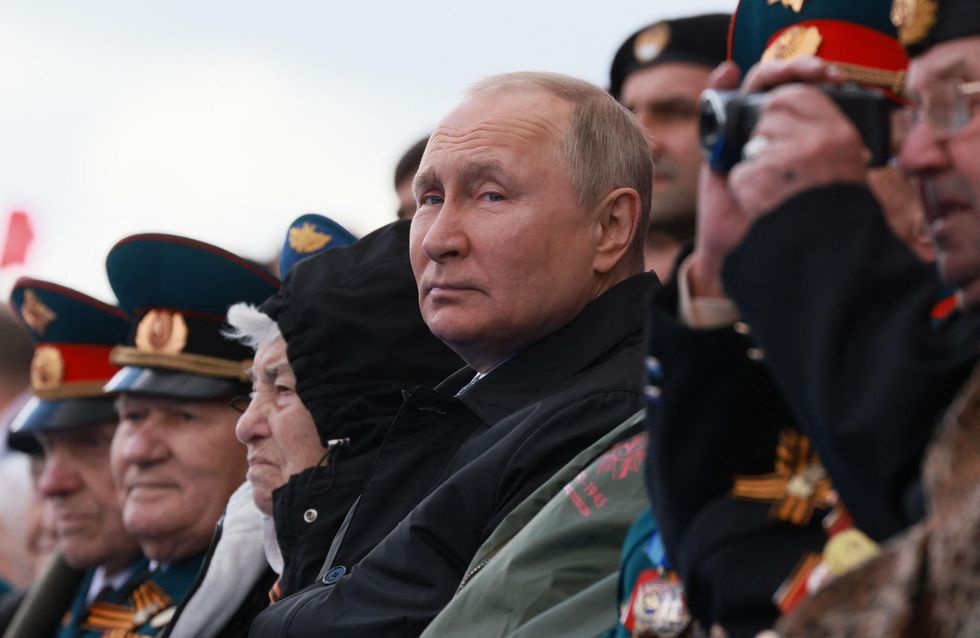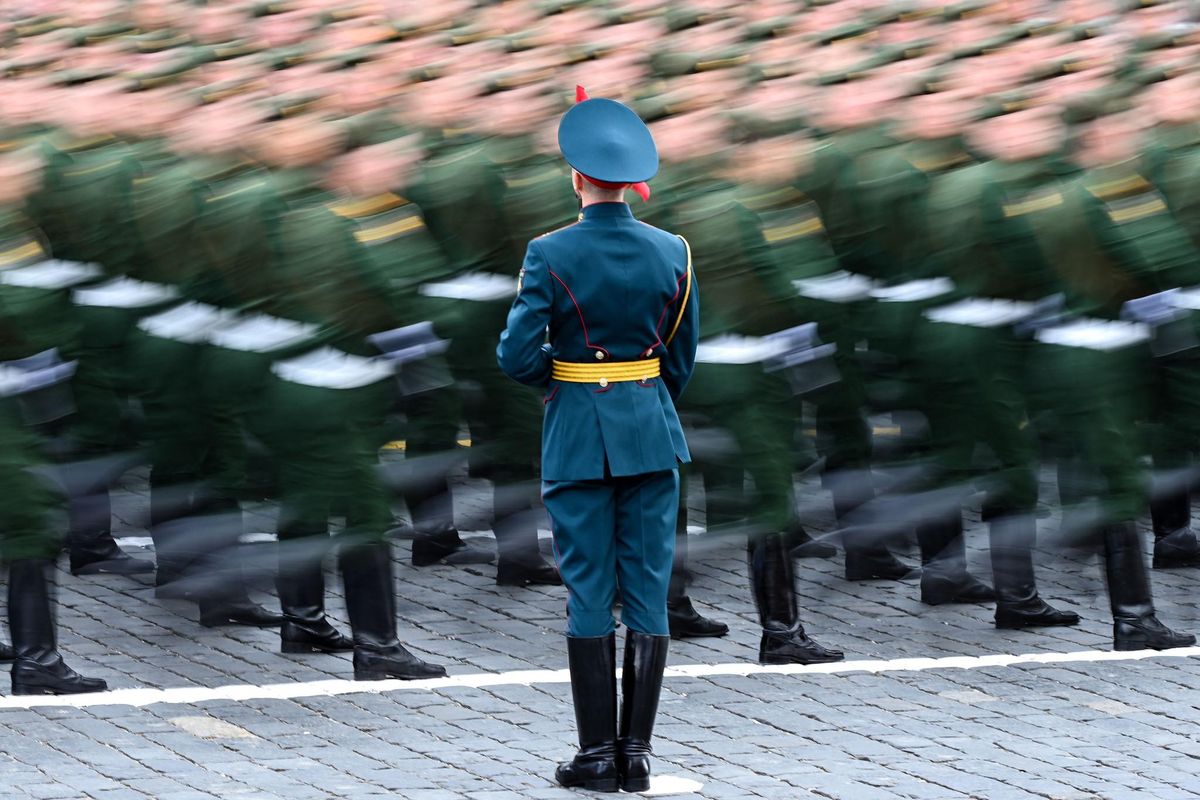Every May 9th Russia celebrates Victory Day, an annual holiday commemorating the 1945 Soviet triumph over Nazi Germany in World War II (known in Russia as the Great Patriotic War).
This year, President Vladimir Putin was widely expected to use the occasion to do one of two things: either declare victory in Ukraine and lay the groundwork for some sort of frozen conflict, or escalate—turning the “special military operation” into a proper war, ordering a general mobilization of the Russian people, announcing the annexation of Donetsk and Luhansk, or going nuclear (figuratively, though sadly not entirely) and taking the war to NATO.
As it turns out, he did neither.
Want to understand the world a little better? Subscribe to GZERO Daily by Ian Bremmer for free and get new posts delivered to your inbox every week.
 Putin watches Victory Day military parade
Putin watches Victory Day military parade
In fact, Putin’s speech contained little we hadn’t heard before. The president doubled down on his bogus claims that Ukraine is an illegitimate state ruled by a Nazi regime bent on obtaining nuclear weapons, that ethnic Russians were being massacred in eastern Ukraine, that a decadent West was seeking to “cancel” Russia, that NATO and Ukraine were planning to take Crimea and the Donbas from Russia. He justified the invasion of Ukraine as a “preemptive” rebuff of Western aggression.
In Putin’s accounting of it, the war (which he does not acknowledge as such) is one of self-defense, his decision to strike “forced” upon him by the imminent threat posed by Russia’s enemies:
Another punitive operation in Donbas, an invasion of our historic lands, including Crimea, was openly in the making. Kiev declared that it could attain nuclear weapons. The NATO bloc launched an active military build-up on the territories adjacent to us. Thus, an absolutely unacceptable threat to us was steadily being created right on our borders.
There was every indication that a clash with neo-Nazis and Banderites backed by the United States and their minions was unavoidable [...] Russia launched a pre-emptive strike at the aggression. It was a forced, timely and the only correct decision.
Although Putin didn’t make his war aims explicit, he did provide some clarity on the bare minimum he might be willing to settle for:
- The Donbas, which he described as Russian land, formally annexed or independent.
- Crimea in Russian hands.
- Ukraine barred from obtaining nuclear weapons.
While the third goal was always a certainty (war or no war) and the second is already a hard-to-reverse political reality, the first of Putin’s non-negotiable objectives is both unacceptable to the Ukrainians and increasingly unattainable to the Russians.
What does the speech mean for the war going forward?
On the one hand, it’s good news. Contrary to foreboding intelligence reports and analyst predictions, Putin didn’t order a mass mobilization or put the country on total war footing. While the Kremlin and its media stooges continue to rail against NATO and cast the war as an existential struggle that Russia must win at all costs, Putin didn’t tie his own hands by committing to specific war aims he may not be able to achieve. Instead, he kept his objectives vague and retained enough flexibility to allow him to move the goalposts should his troops continue to fall short of his plans. The alternative—Putin publicly committing to pursuing specific, observable, and maximalist ends with limited means—would’ve been a recipe for humiliation and, therefore, escalation.On the other hand, it’s bad news. Despite having few notable military achievements to show for, Putin could have used the speech to declare the second phase of the “special military operation” in Ukraine successful, having “liberated” Russians in the Donbas who had been previously “oppressed” by the Kyiv regime. He could have said that Ukraine had been effectively “de-Nazified and de-militarized,” having defeated the Azov battalion in Mariupol and degraded Ukraine’s military capabilities. All of this is false, of course—Russian forces have not yet managed to fully capture the city of Mariupol, let alone secured the entire Donbas, and Ukraine’s military is better armed than ever thanks to Western support. But Putin maintains near-absolute control of information within Russia, so he could have sold this narrative to his domestic audience.
Why is it bad news that he didn’t? Because that claimed “victory” could have been the face-saving offramp he needed to lock in his gains, cut his losses, and freeze the conflict—or even to start negotiating a ceasefire and a rollback of sanctions. The fact that he didn’t take this opportunity even when the political costs of doing so would have been minimal signals that Putin has no intention of backing down—at least as long as he believes he can achieve his primary goal, seizing the entire Donbas, through military means.
By now, Putin has thrown everything he has at the Donbas offensive, where Russia is currently gaining barely 1-2 kilometers of ground in Luhansk and Donetsk each day but steadily losing territory to Ukrainian counteroffensives around Kharkiv and Kherson. Having racked up casualties and equipment losses at an alarming rate, the Russian military has little gas left in the tank in terms of both men and materiel. To be sure, it will continue to use artillery and missiles to destroy Ukrainian infrastructure and kill Ukrainian civilians, and its blockade of Ukraine’s Black Sea ports will keep throttling the country’s economy. But unless Putin orders mass conscription and mobilizes a war economy, which is unlikely as it would erode popular support for his war, Ukrainian forces—progressively better armed and with much higher morale than their Russian counterparts—should be able to start taking back territory in the Donbas by June. Meaning that Putin is not going to achieve his one non-negotiable goal anytime soon.
For their part, the Ukrainians (understandably) aren’t remotely ready to consider a ceasefire or a peace deal that locks in a single inch of territorial loss vis-à-vis February 24—not when they are getting more and better weaponry from the West every day and as a consequence have a real and growing chance to drive the Russians out entirely. President Volodymyr Zelensky’s own May 9 address made that clear.he U.S. and its allies, meanwhile, are hardening their position, with Europeans close to passing their toughest round of sanctions yet, U.S. President Biden recently signing the Ukraine lend-lease act into law and asking Congress to approve $40 billion in additional aid, and Finland and Sweden about to join NATO. But because Western governments are all escalating for their own domestic political reasons and each is pursuing a different set of goals, their escalation is neither coordinated nor strategic. This makes the conflict harder to solve and means the potential for it to spiral out of control will continue to grow.
On balance, then, Putin’s speech should make us more pessimistic than before about where the conflict is headed: toward an unstable stalemate with more prominent downside than upside risks.
🔔 And if you haven't already, don't forget to subscribe to my free newsletter, GZERO Daily by Ian Bremmer, to get new posts delivered to your inbox.



















